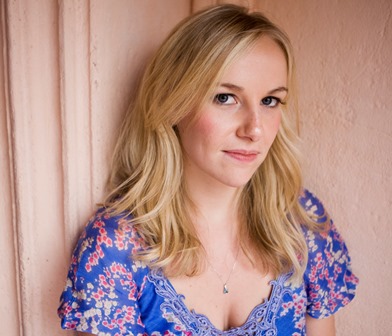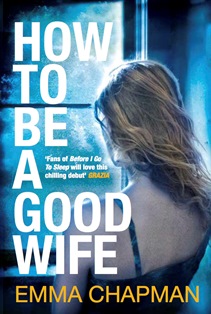Author Emma Chapman explores the doubts writers face when writing their first novels, and how important it is for writers to banish these doubts and carry on writing regardless.

Over dinner recently, my husband told me that he’d never thought my novel would ever be published. I nearly choked on my casserole. I couldn't believe that he was admitting this a year after my novel had come out.
“How can you say that?” I asked. “You lied to me!”
He watched me, and then he smiled. I was a second away from poking both his twinkly eyes out. “Don’t get angry,” he said, “Let me explain.”
He’s a realistic sort of person. He told me that considering the odds of getting a book published, he’d known from the moment I told him (while we were still at university) that I wanted to be a writer, that it would probably never happen. And that when it actually did, after four years of writing the novel while working full time, he was amazed in the most wonderful way.
“Why didn’t you tell me this when I was writing it?” I asked, trying to sustain my anger.
He laughed. “If I’d done that, do you think you would have continued?”
“Yes,” I spat. “Of course.”
But the more I thought about it, the more I realised that he was right to have kept his doubts from me. If someone that important in my life, the person who arguably knows me best, had sat me down and told me that he thought what I was trying to do was impossible, it would have been a wavering moment. It would have made me question my own judgement.
I’d had those kind of tentative conversations with other people, who asked exactly how long I was going to keep editing this novel without hope, while stirring their tea and avoiding eye-contact. Most of the time, they’d made me defiant: determined to prove myself. But other people’s views can gradually chip away at your resolve, and I know that hearing it from my husband would have been difficult.
He never gave me any signs of doubt throughout those four years. In fact, sometimes when I was feeling down about my slow progress, I sort of expected him to tell me to pull myself together. But he never did. He’d listen patiently to my grumblings, and just when I thought he was going to tell me to get on with it, he’d say exactly what I needed to hear. One example: halfway through writing How To Be A Good Wife, I told him how I’d been sitting in my office all day, unable to write a word. He listened without interrupting. When I finished, he was silent. Then, he said just five words. You are not a tap.*
It took me a minute to work out what he meant. But then, I felt a terrific rush of relief. No, I wasn’t a tap. I couldn't expect to just sit down and flip a switch and for the words to pour out perfectly onto the page. Anyone who has tried to write anything will know it doesn’t work like that. The periods of time when you can’t write anything are frustrating, but sometimes necessary.
These are the daily battles of being a writer: the struggles with anxiety and blankness that punctuate our days. Somehow, I thought they’d all dissipate after publication. But I’m sorry to report that they haven’t. Mastering them and learning to see them as part of the job are skills I am still trying to master.
When I first found out in October 2012 that my book was going to be published, I thought I would have no reason to be unhappy ever again. Being a published writer had been a dream for so many years, and I rode a huge wave of excitement every time I remembered it was really going to happen. Of course, it’s an absolute privilege, and one that I would never moan about (except to my husband of course). Every day, I know I am lucky to have had this opportunity. My book is a physical embodiment of all those moments of doubt and fear, something I can hold in my hands knowing each and every moment that went into making it.
And there have been moments along the way that I still can’t really believe have happened. Receiving a wonderful quote for my novel from Hilary Mantel who I admire so much, totally out of the blue. Reviews that made my heart stop as I was reading them, sure that the next sentence would hold the huge BUT that made everything else come tumbling down. The flushed, excited faces of readers at events, in which I see my own nervousness when I meet other writers. I never really thought someone would look at me like that.
So, every moment of fear and doubt was worth it. But isn’t that easy to say now that my book is wrapped up neatly inside its cover? It would be, if I wasn’t constantly reminded of that struggle every day as I work towards finishing my second novel, repeating the entire process I thought I would be immune to this time around.

But I know now that those doubts are part of the process. That I will probably never overcome them. That they are what push me to improve, to keep working hard.
I wanted to write this all down to tell any aspiring writers to firmly switch off those doubting voices. In order to succeed in any area of our lives, we need to be blind to them. We need to ignore the odds against us, ignore the rules, and focus on the writing itself. Focus on the product and what we want it to be. We need to force ourselves to be arrogant, to be precocious, to believe.
It’s nearly impossible to do. It’s a sort of delusion, and one that those closest to you need to join in with. It’s a lot harder if people around you are reminding you that what you’re trying to do will never happen. You need to surround yourself with people who allow you to believe it. I was angry with my husband because I thought he’d lied to me. And he had, really. But those were necessary lies, without which my book might never have existed at all.
*If you look in the acknowledgements of How To Be A Good Wife, you’ll find a thank you for husband for this very moment.
To find out more about How To Be A Good Wife, take a look at the website.
Comments